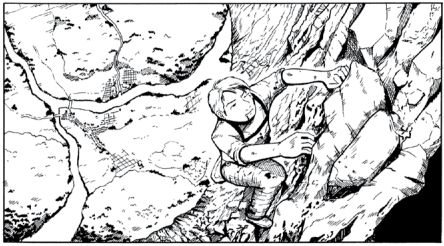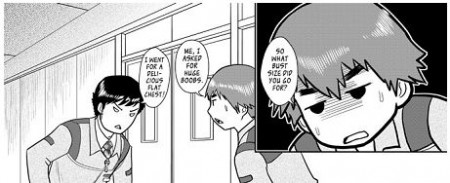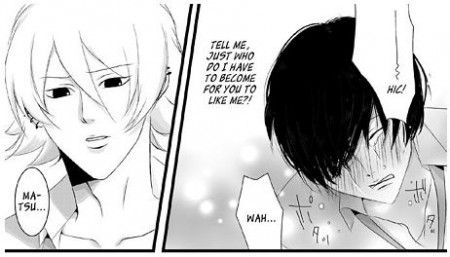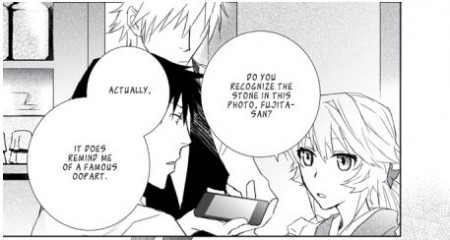GEN Issue 14 Review
Demonstrating a very encouraging evolution, this month’s 14th issue of indie manga anthology magazine GEN is the best issue yet, featuring substantial, fascinating chapters of six ongoing Japanese doujinshi manga serials. Read on for an extensive issue review.
The second chapter of Lumo’s sci-fi/horror tale “Psycho” switches into dense expository mode, revealing a bit of a yaoi origin that’s been creeping into recent issues of GEN, and a tangled web of tragedy and tortured emotions that reveal the story as a more affecting tale than the action-oriented first chapter let on. Reaction to the chapter will certainly vary by reader, with some finding it too melodramatic while others will appreciate its precious manner. The ambition of the story, however, it unmistakable and commendable. Other technical aspects of the story are a similar compromise. The graphic art has a visual consistency that the first chapter somewhat lacked, but occasional designs look rough and incomplete. Furthermore, Psycho’s characterization and even visual design skews wildly from very masculine to extremely feminine to a medium hybrid. Ultimately, the chapter is a very interesting expansion of a rapidly evolving manga tale.
Kosuke Kabaya’s latest chapter of Android Angels is a loose continuation of the story from last issue. Unlike previous installments of “Android Angels,” however, the “Butterflies of Metro City” chapter is a highly enjoyable hybrid of otaku satire and gentle, heartwarming romance. The series’ art design, which began as a sort of homage to the vintage manga of Shotaro Ishinomori, in this chapter becomes very contemporary, resembling the comical designs of the “Mini-Pat” and Chouyaku Hyakunin Isshu Utakoi anime. The story will certainly appeal to fans of humorous otaku-philosophy manga like Genshiken and Maniac Road while, at the same time, the story manages to work in serious analysis of the way humans naturally perceive relationships. As “Android Angels” has been consistently getting better with each passing month, this latest story is the most complete and affecting episode so far.
Love’s third chapter of One is Enough lays on the gay romantic angst thick and heavy. Although not graphically explicit, this chapter includes some strong language and intense events that could possibly offend the most sensitive readers. Just like this month’s chapter of “Psycho,” this chapter of “One is Enough” may polarize readers into either appreciating the story’s emotional wrangling or finding it all over-the-top. The very diversity of possible reaction, however, designates the work as a provocative one. The visual art is soft, warm, and very expressive, although proportions are sometimes just a little bit off or distorted.
The latest chapter of Isora Azumi’s “Stones of Power” once again feels like a bit of an anomaly within GEN because the story simply doesn’t look or feel like an amateur manga. Especially like the previous month’s installment, the story has a graceful, refined look and a very confident, measured story that feels like a talented veteran manga creator’s creation rather than an amateur’s work. This month’s chapter reveals a bit more information about the current storyline and deepens its characterizations a bit, but doesn’t advance the action of the plot very much.
Nukuharu’s very short Anomal chapter seems like a bit of an odd hybrid between an art style reminiscent of Hiromu Arakawa and Sorachi Hideaki and a narrative reminiscent of CLAMP’s XXXHOLiC. The supernatural tone and vaguely anachronistic setting continue to evoke Yuki Urushibara’s Mushishi. Although this month’s relatively short chapter revolves around serious and melancholy themes, its focus and its art design keep the story decidedly lighthearted.

Artist Hajime Taguchi’s “Alive” story this month is a single long story rather than the typical collection of shorts. As usual, the tale is a philosophical introspection on the nature of human ambition and the degrees at which people strive for more or simply accept the disappointment of “reality.” This month’s story may not have the most original narrative, but it compensates with unusually attractive background art and an especially strong depiction of sequential action through illustration. It makes for a good, satisfying conclusion to an especially strong issue of GEN.
GEN issue 14 feels like the publication’s strongest singular issue so far thanks to an eclectic variety of stories that all feel particularly substantial and memorable this month. GEN proves itself to be an essential primer on today’s underground and non-mainstream Japanese manga. Issue 14 is rewarding reading for regular readers, new readers interested in manga that’s a bit off-the-beaten-path, and aspiring artists that want to examine emerging and evolving brand new manga straight from the creative heart of Japanese comic culture.






